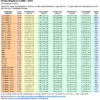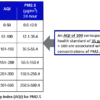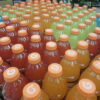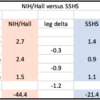Pharmaceutical studies are among the most demanding scientific investigations because the results can be a matter of life or death. Astonishingly, 92% of drugs deemed safe and effective in animals, fail when tested in humans. The murine model — mostly mice and sometimes rats — is invaluable in the preliminary stages of investigating pharmaceuticals and […]
Archive | The Science

Bisphenol A and Analogues – NHANES
Fourth National Report on Human Exposure to Environmental Chemicals Updated Tables, March 2021 Geometric mean and selected percentiles of urine concentrations (in μg/L) for the U.S. population from the National Health and Nutrition Examination Survey. Excerpted data. Selected full data tables follow Volume One: NHANES 1999-2010 Bisphenol A Bisaphenol F and S not monitored Volume […]

Hall Flaws
A high-profile 2019 nutritional study headed NIH research section head Kevin Hall is coming under increasing fire for data and protocol shortcomings. This ad-free article is made possible by the financial support of the Center for Research on Environmental Chemicals in Humans: a 501(c)(3) non-profit. Please consider making a tax-deductible donation for continued biomedical research. In addition, the […]

Air Pollution: Confounding Factors for Study
Air pollution confounding factors The Kincade Fire in northern Sonoma County started on October 23, 2019, was contained on Nov. 6 but continued to burn and affect the test location during and after the SSHS study was finished. Because PM 2.5 is a potent inflammatory agent, a monitoring device was purchased to track indoor air […]

Inflammation, PM2.5 and Serious Health Effects
Particulate pollution, especially those of 2.5 microns or smaller — has been demonstrated to cause, promote, or aggravate numerous serious health effects including inflammation and specific syndromes involving the immune system, diabetes, insulin resistance, metabolic syndrome, cardiovascular disease as well as neurological and psychological maladies. This ad-free article is made possible by the financial support […]

Biomedical Science and Pharmaceutical Research Embrace N-of-1 Trials
The use and scientific acceptance of “n-of-1” trials have accelerated in recent years, especially in connection with personalized medicine and drug discovery. This increase in interest and acceptance is reflected in the number of studies on the field. This ad-free article is made possible by the financial support of the Center for Research on Environmental […]

Additional Posts Incorporated In or Used as References in Primary Articles
Primary articles Results of Proof-of-concept study indicate that hsCRP may be valid indicator of Bisphenol A contamination, but finds that ubiquitous co-confounding factors may invalidate most dietary interventions Significant changes necessary in order for dietary intervention studies to be causal and replicable This ad-free article is made possible by the financial support of the Center […]

Recent Dietary Interventions Relevant to Plastic-Derived Chemicals
el, R.A., Gray, J.M., Engel, C.L., Rawsthorne, T.W., Dodson, R.E., Ackerman, J.M., Rizzo, J., Nudelman, J.L., and Brody, J.G. 2011. Food packaging and Bisphenol A and Bis(2-Ethyhexyl) Phthalate exposure: Findings from a dietary intervention. Environmental Health Perspectives 119(7): 914-920. Sathyanarayana, S., Alcedo, G., Saelens, B.E., Zhou, C., Dills, R.L., Yu, J., and Lanphear, B. 2013. […]

Significant Changes Necessary in Order for Dietary Intervention Studies to be Causal and Replicable
Dietary intervention studies as a whole are inherently flawed and do not produce causal or clinically relevant health recommendations or decisions. This ad-free article is made possible by the financial support of the Center for Research on Environmental Chemicals in Humans: a 501(c)(3) non-profit. Please consider making a tax-deductible donation for continued biomedical research. Accuracy and replicability of […]